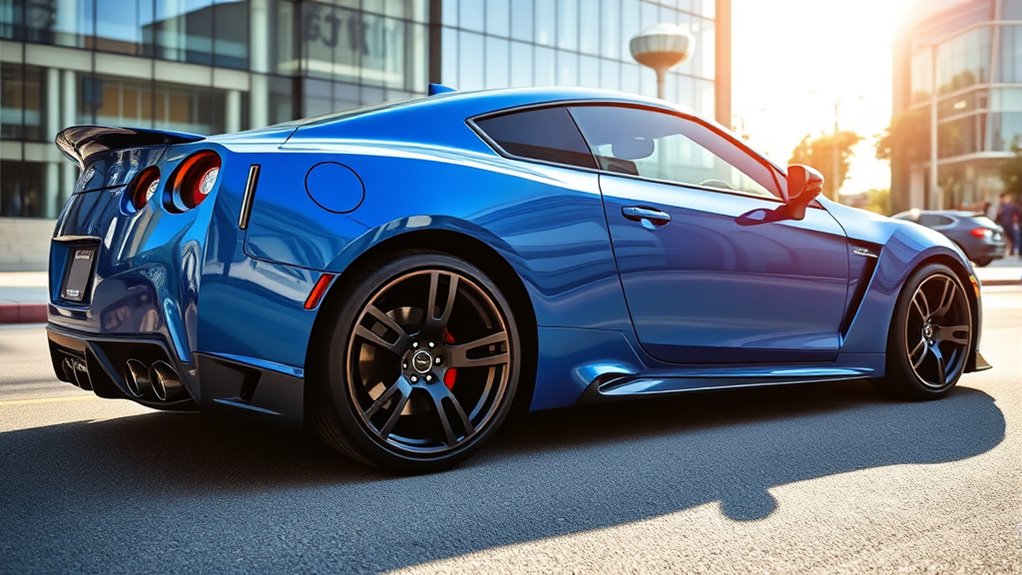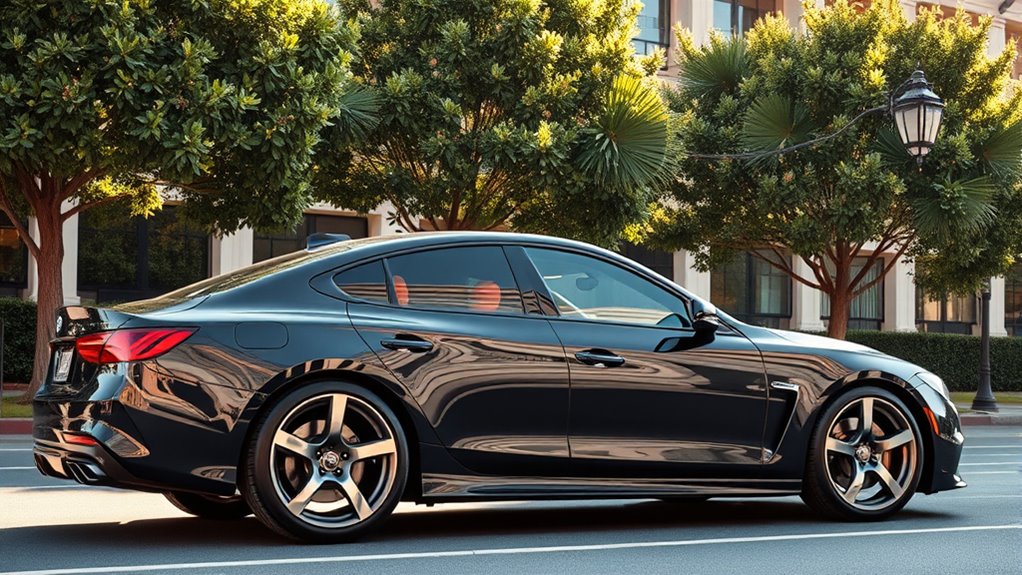Tuning can either boost or hurt your vehicle’s resale value, depending on how you approach it. High-quality, reversible mods like ECU remaps or suspension upgrades tend to attract buyers and improve resale prospects. However, poorly executed or niche modifications may scare off potential buyers and reduce your car’s worth. Staying within legal limits, keeping detailed records, and maintaining your vehicle well can help preserve its value. Explore more to discover how to maximize your investment.
Key Takeaways
- Well-documented, high-quality tuning can enhance vehicle appeal and potentially increase resale value.
- Custom modifications may reduce resale value if they are niche, poorly executed, or hard to revert.
- Reversible, widely accepted upgrades like ECU remaps and suspension boosts generally support higher resale prices.
- Illegal or unapproved mods can void warranties, complicate insurance, and negatively impact resale prospects.
- Maintaining vehicle presentation and documentation post-tuning helps preserve or improve resale value.
How Modifications Affect Vehicle Depreciation

Modifications can substantially impact how quickly your car depreciates. When you customize your vehicle, especially with niche or poorly executed mods, it can hurt its resale value. Many buyers prefer stock cars or those with easily reversible modifications, so highly personalized tweaks often make your car less attractive on the resale market. These changes can raise concerns about reliability, warranty coverage, and future repair costs, further lowering its value. Additionally, controversial or significant modifications tend to narrow the market, making it harder and slower to sell your vehicle. The presence of aftermarket upgrades can negatively influence depreciation rates, particularly if they aren’t well-documented or are viewed as undesirable. Moreover, GMC tuning can sometimes complicate resale if not properly documented or if it’s perceived as affecting the vehicle’s reliability. It is also important to consider how cybersecurity vulnerabilities related to vehicle modifications, such as connected or digital tuning systems, might influence buyer confidence. Another factor to consider is the asset division implications of certain modifications during divorce proceedings, which can affect valuation. Overall, excessive modifications tend to accelerate depreciation and reduce your car’s resale appeal. Properly executed and documented Toyota tuning modifications, on the other hand, can sometimes enhance a vehicle’s appeal if they align with buyer preferences. Understanding the impact of modifications on depreciation can help you make informed decisions when customizing your vehicle.
The Role of Quality and Reversibility in Modifications

When considering upgrades to your vehicle, prioritizing quality and reversibility can make a significant difference in maintaining its resale value. High-quality modifications from reputable brands, installed professionally, are more likely to retain or boost your car’s worth compared to cheap, DIY fixes. Reversible modifications, such as aftermarket wheels or performance tuners, let you easily restore your vehicle to its original state, preserving its resale potential. Proper documentation of your upgrades can also enhance buyer trust and facilitate smoother transactions. Additionally, choosing modifications that are easily reversible ensures you can adapt to changing preferences or market demands without permanent alterations. Poorly executed or mismatched parts, on the other hand, can lower your car’s perceived value and scare off buyers. Documented, high-standard upgrades not only boost buyer confidence but also make your vehicle more appealing in the resale market. Furthermore, ensuring your modifications follow proper sound therapy techniques can help maintain the integrity of your vehicle’s systems and prevent potential issues. Incorporating financial management strategies when planning upgrades can further safeguard your investment. Moreover, selecting durable and safe components aligns with the safety standards and expectations of prospective buyers. Ultimately, focusing on quality and reversibility helps protect your investment and minimizes depreciation over time.
Legality, Warranties, and Insurance Considerations

Ensuring your vehicle remains compliant and protected involves understanding how modifications impact legality, warranties, and insurance. When you tune your car, it can void warranties, especially if your ECU shows TD1 codes detectable through scans. To avoid issues, you might revert to stock settings and drive 100-200 miles before service. Many insurance policies demand full disclosure of all modifications; failing to do so can lead to claim denials or cancellations. Illegal or non-compliant modifications, like emissions tampering, can make your vehicle unroadworthy and uninsurable. Proper documentation and understanding regulatory compliance are essential to stay within legal boundaries. Additionally, some modifications may be flagged during ECU scans, increasing the risk of warranty denial. Being aware of regional legal standards can help you ensure your modifications stay within the law. Ensuring your modifications align with emissions regulations can prevent violations and fines. *Unapproved modifications* can sometimes trigger legal issues and fines, emphasizing the importance of staying informed about local regulations. Visualize this with:
- A vehicle flagged for ECU scans, risking warranty denial
- An insurance policy rejected after undisclosed mods
- A vehicle deemed illegal and uninsurable due to tampering
Staying within legal and warranty boundaries ensures your modifications don’t jeopardize your vehicle’s protection.
Market Demand and Popularity of Custom Upgrades

Have you noticed how certain custom upgrades can boost your vehicle’s resale value? Popular modifications like ECU remaps, high-performance exhausts, and upgraded suspension are in demand among enthusiasts and tend to increase cars resale value. These modifications can affect how potential buyers perceive your car, making it more attractive if they align with current trends. Additionally, understanding market trends can help you choose upgrades that are more likely to appeal to a broader audience. It’s also helpful to consider that emotional expression and creativity through aesthetic enhancements can make a vehicle stand out positively. For instance, incorporating sector performance data can guide you toward upgrades that are trending in the automotive market, ensuring your modifications remain relevant. Moreover, staying informed about consumer preferences can help you select modifications that are less likely to become outdated quickly. Trends in vehicle customization also influence what buyers value most, making it essential to stay updated. However, niche upgrades like off-road lifts or unique body kits may appeal to specific buyers but can limit the broader market demand. Widely accepted aesthetic upgrades, such as premium alloy wheels or subtle cosmetic enhancements, often boost resale appeal. Keep in mind that trendy or highly specialized modifications can quickly become outdated, which may decrease long-term resale value if they fall out of favor locally or among potential buyers.
Best Practices for Maintaining Resale Value After Tuning

To preserve your vehicle’s resale value after tuning, it’s essential to revert any modifications back to their original state before selling. Make sure you flash the original ECU firmware and drive enough miles to clear diagnostic flags like TD1. Keep detailed records and receipts of all modifications and professional services to demonstrate the quality of the modifications, which can positively affect the resale. Use reputable, high-quality, and reversible modifications to reduce the risk of devaluation and maintain the vehicle’s original appeal. Avoid overly personalized or niche upgrades that may alienate potential buyers. Remember, modifications impact the value of your car, so focus on improvements that are widely accepted and easily reversible to maximize resale value. Additionally, paying attention to appetizer presentation and overall vehicle cleanliness can enhance buyer perception and support a higher resale price. Incorporating automated systems to maintain regular maintenance schedules can also help preserve your vehicle’s condition and value over time. Proper documentation of professional services can further reassure buyers of the vehicle’s maintained condition and history.
Frequently Asked Questions
What Affects the Resale Value of a Car the Most?
You might wonder what mainly affects your car’s resale value. Extensive or poorly done modifications can scare off buyers, lowering the price. If your upgrades void warranties or hike insurance costs, they hurt resale too. High-quality, reversible mods from reputable brands help preserve value, but trendy or niche changes can limit your market. Keep documentation clear, and focus on tasteful, reversible upgrades to maintain or boost your car’s worth.
Do Car Modifications Affect Resale Value?
Think of your car like a story—modifications are like chapters that can either add flair or confuse the reader. When you tweak your vehicle, it can lower resale value if the changes look amateurish or are poorly done. However, high-quality, reversible upgrades from reputable brands might appeal to niche buyers. Keep documentation and restore it to stock if needed, and your modifications won’t hurt your resale prospects as much.
Which Factor Impacts the Resale Value of a Car the Most?
You might wonder what affects your car’s resale value most. Generally, the quality and execution of modifications play a big role. If you’re careful with high-quality, reversible upgrades, you can maintain or even boost your car’s worth. But keep in mind, radical engine tuning or poorly done changes can hurt resale. Being transparent and keeping documentation helps reassure buyers, protecting your car’s value in the long run.
Is Getting a Car Tuned Worth It?
Getting a car tuned can boost your driving experience and performance, making it worth considering if you want more power or responsiveness. However, weigh the potential downsides, like voiding your warranty or decreasing resale value if the tune isn’t done properly. If you plan to keep the car long-term and manage the tune carefully, the benefits often outweigh the risks, especially with professional, reversible modifications.
Conclusion
While tuning can add a personal touch to your vehicle, it’s wise to contemplate how subtle changes might influence its future charm on the market. Thoughtful modifications, done with care and awareness, can preserve or even enhance your car’s allure over time. By balancing your desire for customization with mindful maintenance, you guarantee your vehicle remains a refined expression of your personality—without inadvertently dimming its resale potential. After all, a well-tended car often speaks for itself.










